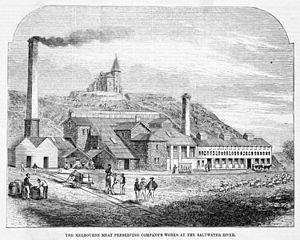Pipemakers Park facts for kids
Quick facts for kids Pipemakers Park |
|
|---|---|
| Type | Public Park |
| Location | Melbourne, Australia |
| Area | 8 hectares |
| Operated by | City of Maribyrnong |
| Visitors | 750 per month approx. |
| Status | Open |
| Paths | Sealed paths |
| Terrain | Remnant Riparian Bushland |
| Water | Maribyrnong River, artificial wetlands |
| Vegetation | Australian Native |
| Connecting transport | Car, Bus |
| Landmarks | Maribyrnong river |
| Facilities | Toilets, Barbecues, Picnic areas, Conference room, ecomuseum, Wildlife sanctuary |
Pipemakers Park is a cool place to visit in the western part of Melbourne, Australia. It's right next to the Maribyrnong River. This park is special because it used to be a factory that made pipes and preserved meat!
Today, you can find old buildings that have been turned into a museum called the Melbourne's Living Museum of the West. You can also see old factory parts that tell a story about the past. The park covers about 8 hectares, which is like 16 football fields!
The City of Maribyrnong council now looks after the park. They took over from Parks Victoria in 2014.
Park History: From Factory to Fun!
Pipemakers Park has a long and interesting history. Back in the 1840s, a man named Joseph Raleigh started a "boiling down" factory here. This factory processed animal products.
Later, in 1868, the site became the Melbourne Meat Preserving Company. They preserved meat to keep it fresh for a long time. Around 1911, a company called Humes Pipe took over the site. They started making pipes here.
In the 1980s, the land was bought by the MMBW (Melbourne and Metropolitan Board of Works). They decided to turn the old factory site into a park. Pipemakers Park officially opened in 1984. It also became the home for the Living Museum, which helps people learn about the area's past.
Park Geography: Where the River Meets the Land
Pipemakers Park is located on a flat area next to the Maribyrnong River. This flat land is called a floodplain. It sits below a steep hill made of basalt rock. The park's location by the river makes it a unique place for both nature and history.
 | Laphonza Butler |
 | Daisy Bates |
 | Elizabeth Piper Ensley |


